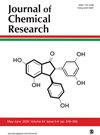In silico molecular docking, DFT, and toxicity studies of potential inhibitors derived from Millettia dielsiana against human inducible nitric oxide synthase
IF 1.2
4区 化学
Q4 CHEMISTRY, MULTIDISCIPLINARY
引用次数: 0
Abstract
Inducible nitric oxide synthase is known as a potential biological target that plays a crucial role in regulating the release of nitric oxide and is responsible for the amount of nitric oxide released during the inflammation process. Searching for compounds from natural sources that inhibit inducible nitric oxide synthase may reduce excessive nitric oxide production and counteract metabolic diseases originating from prolonged inflammation. One of the valuable medicinal plants with significant anti-inflammatory activity evaluated in this study is Millettia dielsiana. The current work focuses on the molecular docking analysis of compounds derived from Millettia dielsiana to identify potential candidates against the inducible nitric oxide synthase enzyme. As a result, four compounds (D10 (Tupichinol C), D20 (Durmillone), D46 (Glycitin), and D50 (5,7,4′-trihydroxyisoflavone 7- O-β-d-apiofuranosyl-(1→6)-β-d-glucopyranoside) with the most potent inhibitory potential were identified with binding affinities less than −9.0 kcal mol从 Millettia dielsiana 中提取的潜在抑制剂对人类诱导型一氧化氮合酶的分子对接、DFT 和毒性的硅学研究
众所周知,诱导型一氧化氮合酶是一个潜在的生物靶点,它在调节一氧化氮的释放方面起着至关重要的作用,并在炎症过程中负责一氧化氮的释放量。从天然资源中寻找能抑制诱导型一氧化氮合酶的化合物,可以减少一氧化氮的过量产生,对抗因长期炎症引起的代谢性疾病。Millettia dielsiana 是本研究评估的具有显著抗炎活性的珍贵药用植物之一。目前的工作重点是对从 Millettia dielsiana 提取的化合物进行分子对接分析,以确定针对诱导型一氧化氮合酶的潜在候选化合物。结果发现了四种具有最强抑制潜力的化合物(D10(Tupichinol C)、D20(Durmillone)、D46(Glycitin)和D50(5,7,4′-三羟基异黄酮 7- O-β-d-apiofuranosyl-(1→6)-β-d-glucopyranoside ),其结合亲和力小于-9.0 kcal mol-1。此外,使用 ProTox II 网络服务器进行的毒性预测表明,这些化合物具有低毒性(毒性等级为 5)。化合物 D50 在肝毒性、致癌性、免疫毒性、诱变性和细胞毒性方面均无活性。这些化合物的分子描述、电子特性和化学反应性均采用了密度泛函理论。这些发现为今后进一步深入开展生物学实验奠定了基础。
本文章由计算机程序翻译,如有差异,请以英文原文为准。
求助全文
约1分钟内获得全文
求助全文
来源期刊

Journal of Chemical Research
CHEMISTRY, MULTIDISCIPLINARY-
CiteScore
2.30
自引率
0.00%
发文量
66
审稿时长
1.0 months
期刊介绍:
The Journal of Chemical Research is a monthly journal which has a broad international authorship and publishes research papers and reviews in all branches of experimental chemistry. Established in 1977 as a joint venture by the British, French and German chemical societies it maintains the high standards set by the founding societies. Each paper is independently peer reviewed and only carefully evaluated contributions are accepted. Recent papers have described new synthetic methods, new heterocyclic compounds, new natural products, and the inorganic chemistry of metal complexes.
 求助内容:
求助内容: 应助结果提醒方式:
应助结果提醒方式:


